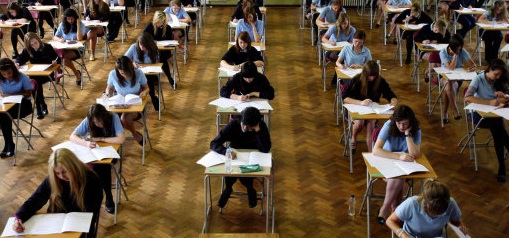The Government and Ofqual cheat at exams because they get away with it every year

The Education Secretary, Ofqual and the Prime Minister have punched the air in delight. They have given full throat to their support for an education system that prioritises the system over the customers. Never mind the hundreds of thousands of students unfairly downgraded by an algorithm – thousands who failed an exam they were prevents from taking – and enjoy the graphs that shows how this year was much like every other. But every other year is also wrong. The system is not fair. The system for grading students in exams is inherently unfair. The algorithm understood that and went with it.
Debra Kidd looks at why 40% of children had their A-levels grades reduced by the system:
Ofqual decided that this was acceptable because in a normal year you would expect around 40% of young people to “underperform”. The algorithm’s reliability percentage was roughly in line with the reliability of putting young people into an exam.
Young people underperform for a number of reasons. The room is too hot; they have a panic attack; their Dad/Grandad/Dog died (forget mitigating circumstances – as far as exams go there’s a time limit on grief). Maybe they forgot to look on the back page of the exam paper and missed that 15 point question (looking at you, son). Maybe their girlfriend dumped them that week (looking at you, husband). Maybe it was a bad day for hayfever. All these factors conspire to ensure that around 40% of young people are disadvantaged every year not because they weren’t capable of success or because they didn’t know the content, but because they had a bad day. What’s our response? “Them’s the breaks. Tough luck.”
Even once they’ve left the exam hall there are circumstances working against them. Ofqual’s own analysis of the 2017 and 2018 exam papers showed a 50% unreliablity factor in the marking of English and History papers. But no-one changed the marks unless a child had stumped up the cash to pay for it. The fact is that the system relies on things going wrong in order to maintain the appearance of rigour. We can’t have too many passing after all – what would that say about our standards? I’m not sure, but I do know what it says about our morality.
It has taken an absurd situation to make these glaring inequalities obvious. In effect what Ofqual unwittingly wrote into its algorithm at an individual, human level was a random allocation of a dead dog/breakup/hot day/panic attack and this is clearly crazy. It explains why teacher grades were not ‘optimistic’ or ‘generous’ but more likely to be a real reflection of what a student could achieve and what they knew. If anything, what those teacher grades showed us was how badly we’ve been underestimating our young. Will there have been a couple of centres who pushed their luck? Probably. 40% of them? No way – not when they knew that their results would be compared to the last three years’ performance. That was the moderating control on the system – fair or not.
Create a system of failure to prove the system works? It might have sounded a little far-fetched before this summer’s exam results arrived, making liars of teachers and fools of pupils. But it is all too plausible. And no the children get no right to appeal. The clock is ticking and the Government and Ofqual have said nothing. They want and expect it to go away and the children are shunted along the conveyer belt.
Posted: 17th, August 2020 | In: News Comment | TrackBack | Permalink


